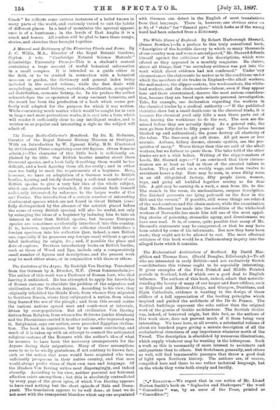The White Slaves of England. By Robert Harborongh Sherard. (James
Bowden.)—In a preface to this truly sensational book, "descriptive of the horrible slavery to which so many thousands of our country men and women are subjected," Mr. Sherard defends himself against the criticisms of his descriptions, which were offered as they appeared in a monthly magazine. He claims, above all things, that "no secondary evidence was put into the work which direct evidence had not confirmed." Under 'any circumstances the statements he makes as to the conditions under which the members of six trades in England—the alkali workers, the nail-makers, the slipper-makers, the wool-combers, the white- lead workers, and the chain-makers—labour, even if they appear here and there overstrained, deserve the most serious considera- tion, because they are based upon minute personal investigation. Take, for example, one declaration regarding the workers in the chemical trades by a medical authority :—" If the published statistics show but a small death-rate in the chemical trade, it is because the chemical yard only kills a man three parts out of four, leaving the workhouse to do the rest. The men are dis- missed before they are actually dying. As a general rule, the men go from forty-five to fifty years of age. The tubes become blocked up and asthmatical:; the gases destroy all elasticity of the tubes. The lime-men get soft stone. All get more or less ansemic. Asthma, kidney disease, chronic cystitis, are the per- quisites of many." Worse things than this are said of the alkali workers, but we forbear to quote them. The tales told of the other trades are not a whit better. Writing of the slipper-makers of Leeds, Mr. Sherard says :—" I am convinced that their circum- stances are at least as bad as those of the sweated tailors in London. They all work on a weekly wage, and from twelve to seventeen hours a day. Here may be seen, in some filthy room in an old dilapidated factory, fifty people (men, women, boys, and girls) all huddled together sewing as for dear life. A girl may be earning 6s. a week, a man from 22s. to 30s. The stench in the room, its uncleanliness, surpass description. The finished garments are lying peil-mell on the floor in the filth and the vermin." If possible, still worse things are related of the wool-combers and the chain-makers, while the examination that Mr. Sherard has made into the condition of the white-lead workers of Newcastle has made him tell one of the most appal- ling stories of poisoning, stomachic agony, and drunkenness we have ever read. It is, of course, quite possible that many of Mr. Sherard's statements may be exaggerated, or that he may have been misled by some of his informants. But now they have been made, they ought not to be allowed to rest. The most effectual criticism of this book would be a Parliamentary inquiry into the alleged facts which it contains.






































 Previous page
Previous page